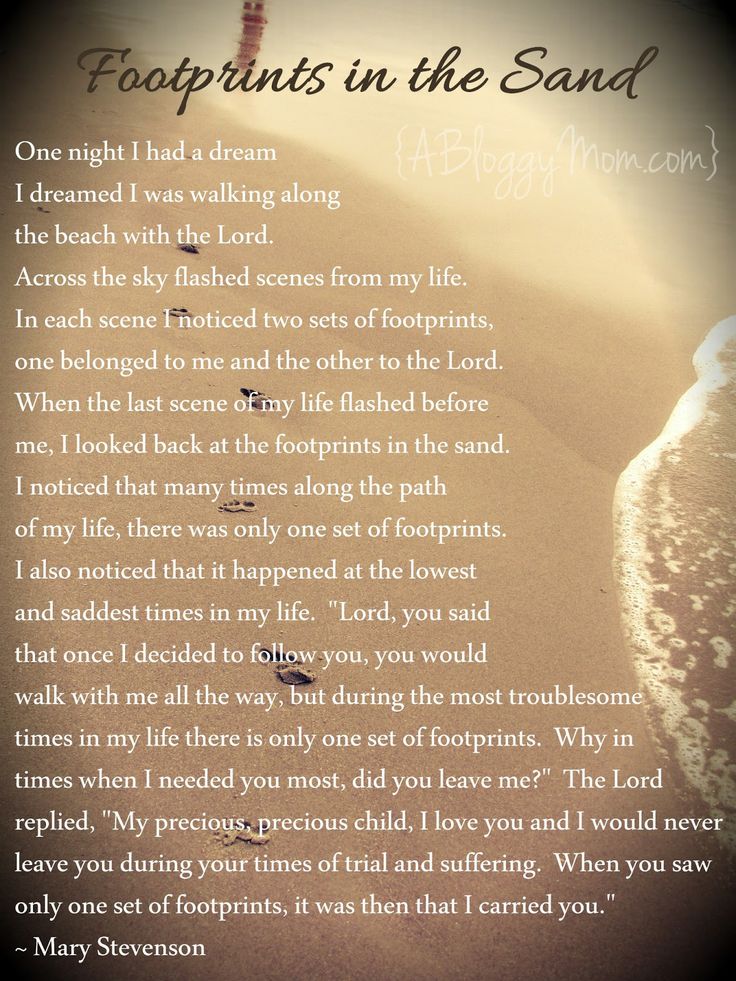

Isaiah 66:18-21
Psalm 117:1-2
Hebrews 12:5-13
Luke 13:22-30
Our reading from Hebrews and from the Holy Gospels this morning are intended for disciples who are far advanced down their spiritual paths. They heard their calling to follow Him; they have reordered and remade their lives, offering true regret for all their sins, omissions, and neglect; they have been for years deeply intentional in conforming themselves to God's Book of Life and to discerning the Holy Spirit's leading down the years. They hear these readings, and they know the truth of them, seen now through the experience of their own life in Christ, and the knowledge of countless others.
Reading them brought me back to my first retreat as a seminarian. I was particularly excited as we gathered because it was being led by an older priest I knew, one who was steeped in spiritual wisdom and graces. And we were not to be disappointed.
He began by asking us if had ever seen the "Footprints" poem, written by Mary Stevenson. Who had not? "Footprints" postcards and posters were prominent in Christian bookstores of the time. It described two sets of footprints along a beach, one set belonging to the Lord and one to a would-be disciple. Through stretches of the journey the two sets had become only one, and the disciple imagined that these represented times when God had abandoned him. No, the Lord replied. "These prints represented times when you could no longer go on, so I carried you."
Our director affirmed the truthfulness of the account saying that this is where most pilgrimages begin. We meet with the Lord and know Him to be God. We enter into intimate relationship with Him through prayer and daily inner dialogue (what St. Teresa of Avila called Mental Prayer), and we turn to Him in adversity, which is a sign of growing maturity. A less steady disciple might abandon God during difficult periods reverting to worldly life. Nonetheless, the disciple's immaturity is also revealed in the poem. He immediately assumes that the lone set of footprints belongs to him, revealing narcissism or self-absorption; he leaps to the conclusion that God has abandoned him, still another mark of his self-centeredness; and he paints a melodramatic picture of his own ups and downs. What does a mature Christian pilgrimage look like? our director asked us. It depicts a life in which we carry the Lord, not one in which He must carry us.
Years later, I became interested in St. Bernard of Clairvaux and read his treatise On Loving God. In it, he describes the ladder of love whose bottom rungs have to do with us loving God solely for own sake. Here we might think of "checklist spirituality": said my morning Office, check; went to Mass, check; said a daily Rosary, check; and so on. In this state of Christian life, we are merely intent on "getting into Heaven" and imagine how happy God will be that we will be there with Him always. As we advance up the ladder we pass through successive stages until we love God only for His sake, and not at all for own sake: we adore Him for only one reason, out of pure love and without a thought for ourselves. This treatise was prized by Thomas Merton and has played an important role in the development of Christian life in the Roman Church during the 1950s and 60s.
Needless to say, hymns, homilies, CCD that keeps people eternally stuck in the "Footprints" poem have the effect of stunting the disciple's growth. The preponderance of hymns that enjoin God to "give to your people," "save your people," "lift up your people," is overwhelming in the canon of post-Vatican-II hymnody. What are Christians, including Catholic priests, who were formed in this spirituality to make of the Mass readings this morning? The Lord reports that the gate leading to Heaven is narrow and that many will not be saved. The writer of the Letter to the Hebrews tells us the Christian life means discipline, which will be painful when it is applied. God will reprove us! He will try us! Our hands and knees will droop in exhaustion!
Ironically, the confirmed disciple of Christ does not want to be coddled and reassured. He or she recognizes these things as belonging to the juvenile emotions of the new Christian, to the one who is rightly grateful for God's love and forgiveness, and who wants to continue, for a time, in that reassuring relationship. But when the time for "baby food" is over, to borrow St. Paul's phrase, the mature disciple is ready to follow as an upright woman or man. Her eyes are on the desert, and her ears are attuned to distant mountains, where the armies of God do battle with the forces of darkness, of which this world is but a pale reflection. These words of Thomas Merton stir the soul, and they remind us that He calls us to high mountains and through narrow passes because everything is at stake. Even the world. Amen.